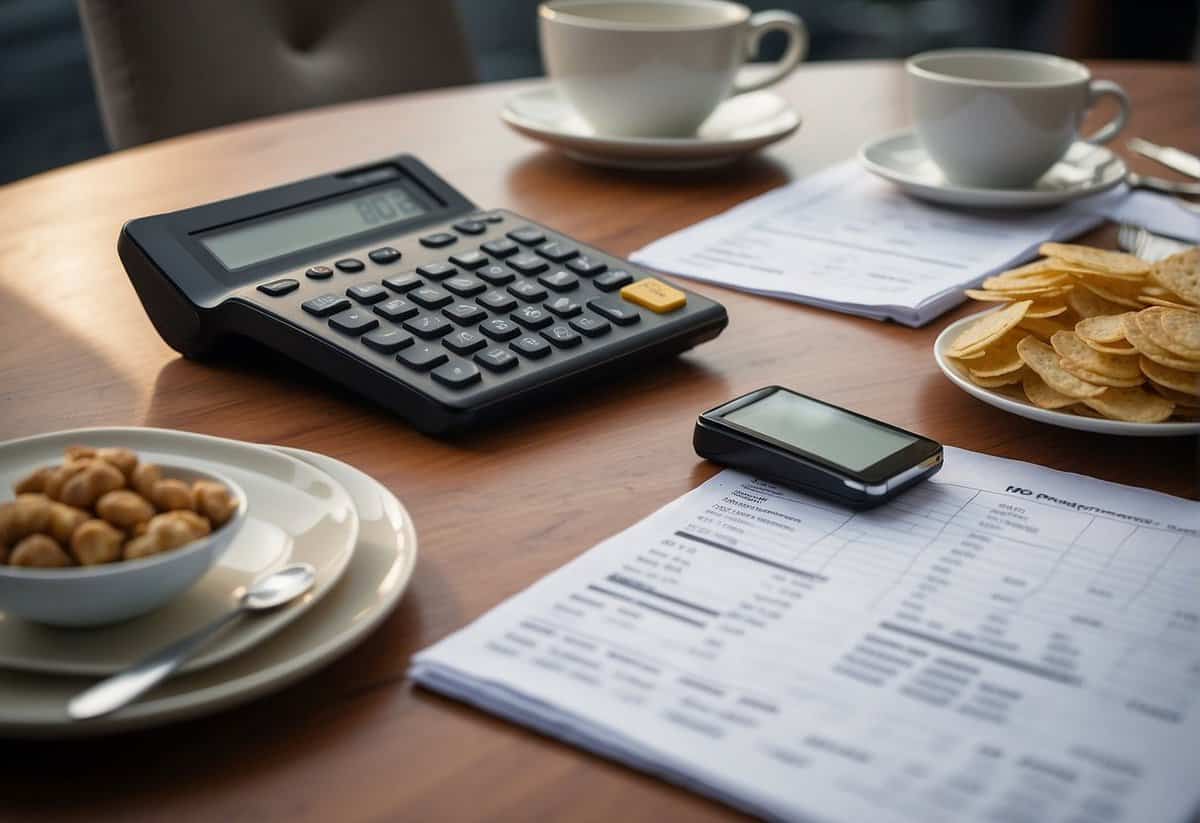How Much Should Parents Pay for a Wedding in the UK? Unveiling Budget Expectations
Navigating the financial landscape of wedding planning can be a complex task, especially when considering who should bear the costs. It’s a common tradition in the UK for the bride’s family to contribute significantly, but with changing times, expectations have evolved. Interestingly, a survey noted that 63% of couples in 2022 received financial support for their wedding from friends and family, indicating that the burden often doesn’t fall solely on the couple.

Understanding how much parents should pay for a wedding doesn’t come with a one-size-fits-all answer. With the average wedding in the UK costing between £25,000 and £30,000, important factors like the couple’s financial independence and the parents’ willingness and ability to contribute play a critical role. Additionally, it’s becoming more common for couples to split the wedding costs with their parents or even fund the entire event themselves, allowing for flexibility and a range of budgeting scenarios.
Key Takeaways
- Traditions are shifting, leading to a mix of funding sources for modern UK weddings.
- Average wedding costs guide the budget but can be tailored to individual circumstances.
- Flexibility in budget allocation allows for personalized financial planning for couples.
Understanding Wedding Costs in the UK

When planning your special day, it’s important to have a clear understanding of the wedding costs you might face in the UK. Knowledge of what you can expect to pay will help you set a realistic budget and spending plan.
The Breakdown of Wedding Expenses
Venue Hire: Often the largest expense, venue hire can vary significantly depending on location and prestige.
Catering: This includes not just the meal for your guests but also drinks and, in some cases, a late-night snack.
Attire: Including both your wedding dress and suits, alteration costs can add up.
Photography & Videography: Capturing your day professionally is an important part for many couples.
Flowers & Decor: From your bouquet to centerpieces, these details bring your wedding theme to life.
Entertainment: This might cover a DJ, live band, and any other performances.
Stationery: Save-the-dates, invitations, and programs are traditional but crucial elements.
Transportation: If you’re planning on making a grand entrance or ensuring guests get home safely, transport can be a considerable cost.
Average Wedding Costs and Budgeting Tips
Your wedding budget should reflect the importance of each aspect of your day. For instance, if live music is crucial for you, allocate more funds there.
- Set a Clear Budget: Start by determining an overall budget that feels comfortable for you.
- Prioritize Important Aspects: Decide what elements of your wedding are most important to you and your partner.
- Research Average Costs: Doing your homework on average wedding costs can give you a baseline. Coming in at an average of £20,700, the current costs have increased in recent years.
- Ask for Help if Needed: Many couples receive financial support from family, so don’t be afraid to have those conversations.
- Consider Season and Day: Marrying off-peak could reduce costs significantly. Winter weddings tend to be cheaper than high-summer ones.
By understanding these expenses and planning ahead, you’ll be well on your way to creating a memorable and financially manageable wedding day.
The Etiquette of Who Pays

When planning your wedding, understanding the etiquette of who pays for what can be both a sensitive and important aspect to consider. It involves a blend of tradition and modern conventions, as well as clear communication and respect for all those involved.
Historical and Cultural Perspectives
Traditionally, in the UK, the bride’s family was expected to cover the majority of the wedding expenses. This expectation stemmed from centuries-old customs that viewed weddings as a form of alliance between families, often linked with dowries and the concept of the bride’s family contributing to the new life of the couple. It’s common for the bride’s family to pay for specific costs such as the wedding dress, venue, and catering.
In some cases, specific family scenarios, such as parents being divorced or remarried, can influence financial contributions, with more people potentially being involved in the cost-splitting. It’s essential to navigate these waters with tact and understanding, recognizing that each family dynamic is unique.
Navigating Contemporary Expectations
Nowadays, there’s an increasing trend towards cost-splitting, with both sets of parents and the couple themselves contributing to the wedding budget. A recent survey revealed that while some couples receive financial support for their wedding from relatives, others prefer to finance their weddings independently. It’s essential for couples to have open communication with their families about their wishes and financial expectations.
In many modern weddings, finding a balance between tradition and contemporary values is key. Couples might decide to handle the costs themselves or choose a mixed approach with contributions from both sides, reflecting the current trends in wedding financing. Certain costs, like the rehearsal dinner and honeymoon, may be covered by the groom’s family.
When you’re planning your wedding, remember that there’s no one-size-fits-all answer. Communication is paramount, and it’s important to discuss early on who feels comfortable paying for what. Every family is different, and while etiquette can provide a guideline, your wedding’s financial planning should ultimately suit everyone’s capabilities and wishes.
Allocating The Budget

When planning your wedding, the budget determines almost every decision. It’s about balancing what’s most important to you with what you or your family can feasibly afford. Here’s how you can approach the financial aspect thoughtfully.
Prioritizing Wedding Elements
- Venue: Typically the largest expense, allocating roughly 40-50% of your budget to the venue will ensure you secure your ideal location.
- Food: Aim for 10-15% of the budget for dining, as this is a crucial part of the reception experience.
- Photography and Music: Together, these can take up another 10-15%, capturing memories and setting the atmosphere.
- Dress and Suits: Set aside approximately 5-10% for attire to look your best without overspending.
- Flowers and Decor: A smaller slice at around 5% can cover the aesthetic elements.
- Wedding Rings: The symbol of your union should have a special allocation, oftentimes around 2-3%.
- Honeymoon: If you’re planning one straight after the wedding, consider dedicating about 10-15% of your total budget for that post-wedding getaway.
Adjust these percentages to what’s most meaningful to you, and remember that creative solutions can help stretch the pounds further.
Managing Contributions and Savings
- Savings: Your personal savings should be the foundation of your wedding budget. This ensures you’re investing in your big day responsibly.
- Financial Contributions: When family offers to help, have candid conversations about amounts and expectations.
- Budgeting: Realistically assess your financial situation to avoid debt. Cutting costs in some areas can free up funds for others.
- Wedding Planner: If costs spiral, consider hiring a planner. They often have insider knowledge and might negotiate better rates, accounting for their own fees.
By allocating your wedding budget in a way that reflects your priorities, you can ensure that your financial contributions and savings culminate in a day that is both memorable and manageable.
Unexpected Wedding Expenditures

When planning your special day, there are often costs that get overlooked which can surprise you. It’s important to be prepared for these unexpected wedding expenditures to ensure your budget covers everything you need for your celebration.
Dealing with Overlooked Costs
Gifts and Gratitudes: You might forget to budget for thank you gifts for your bridal party or small tokens of gratitude for family members who have helped with the wedding.
Rehearsal Dinner: Not just a meal, the rehearsal dinner can often include last-minute attendees, leading to a higher bill than anticipated.
Invitations and Stationery: Including RSVP cards, maps, and information packages, the costs for these essential details can add up, especially if there’s a misunderstanding with the quantity or design, resulting in a need for reprints.
Videography and Photography: Capturing all the moments of your day, including your dream dress might require more than one videographer or photographer, leading to additional costs.
Preparing for Incidental Expenses
Stag Do and Bridal Shower: Activities and venues for these pre-wedding events can rack up a hefty bill not typically accounted for in the initial wedding budget.
Wedding Day Transportation: Necessary transportation for guests, especially if your venues are spread out, can become a costly affair that’s often forgotten.
Officiant and Licenses: Remember to factor in the officiant fee and any legal paperwork required to make your marriage official.
Accommodations: If you have guests coming from out of town, you may need to help with their accommodations which can be an extra expense.
It’s also wise to prepare for incidental expenses such as overtime charges from your DJ, extra floral arrangements or corsages if your guest list expands, or more alcohol and food if the reception party goes on longer than expected. Consider setting aside a contingency budget to cover these so that they don’t become stressors on your big day.
Frequently Asked Questions

Navigating the intricacies of wedding finances in the UK can be complex, but understanding who traditionally pays for what will help you plan effectively. Here are some specifics to guide you.
What expenses are traditionally covered by the bride’s parents in a UK wedding?
Typically, the bride’s parents are expected to pay for the wedding dress, venue, catering, and decorations, aligning with the tradition that they cover the broader costs of the wedding ceremony and reception.
What is the typical financial contribution from groom’s parents for a wedding in the UK?
The groom’s parents often contribute to specific aspects of the wedding, such as the rehearsal dinner or honeymoon, though this can vary greatly between families.
How much should I budget to give my child for their wedding?
Budgeting for your child’s wedding largely depends on your financial means and the type of wedding planned. It’s common for parents to support but consider establishing a specific amount early to aid their planning process.
Which wedding costs are groomsmen expected to cover in the UK?
Groomsmen in the UK typically pay for their own attire and may chip in for the stag party. They’re not usually expected to contribute to the wedding costs directly.
As a parent, what wedding expenses am I expected to cover for my daughter’s UK wedding?
As a parent, you may be expected to cover costs for the venue, wedding dress, and various parts of the reception for your daughter’s wedding. It’s traditional to take on a significant portion of the expenses, but modern practices vary widely.
What wedding costs are typically the responsibility of the groom’s family in the UK?
The groom’s family in the UK often takes care of expenses like the honeymoon and sometimes the costs of the rehearsal dinner. However, each family’s traditions and financial situations can influence this.


